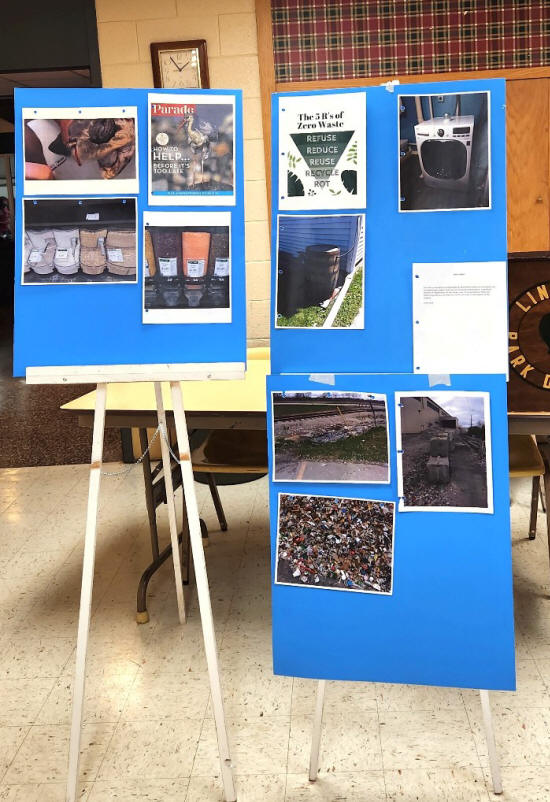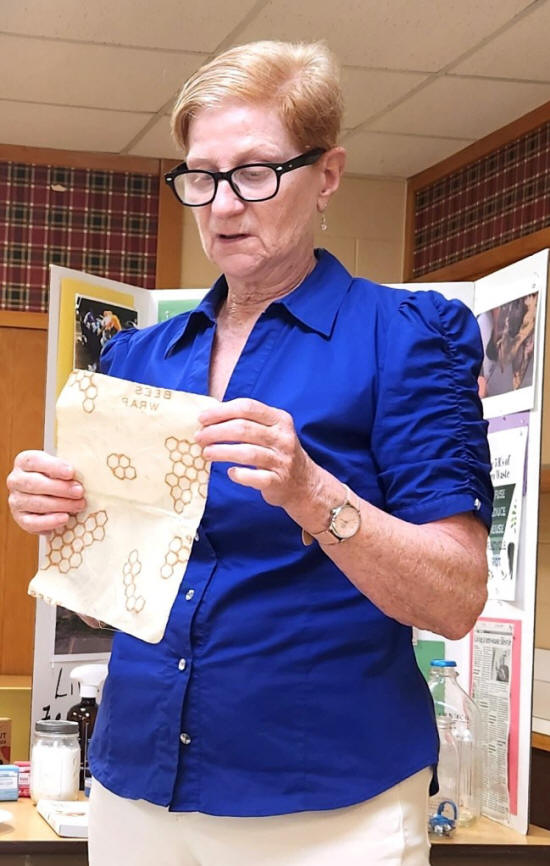|
 To
begin the workshop Stroh provided some information about how much is
thrown away daily. Stroh said the average is 4.9 pounds of trash per
person per day, which is about double what it was thirty years ago.
A family of four produces an alarming 788 pounds of trash per year. To
begin the workshop Stroh provided some information about how much is
thrown away daily. Stroh said the average is 4.9 pounds of trash per
person per day, which is about double what it was thirty years ago.
A family of four produces an alarming 788 pounds of trash per year.
The questions Stroh posed were where did all this trash come from
and how can we reduce it? Stroh said we can reduce the trash and
reduce our stress. Less stuff equals less stress.
Our earth is in a crisis mode and Stroh said unfortunately it is not
being treated as a crisis. Humans have done a lot of damage and need
to reduce habits back to a sustainable way of living.
A registered nurse, Stroh grew up on a farm and her family was
self-sustainable without really trying. Her family had chickens,
cows and a garden. They canned, sewed crafts and clothes, and had
milk delivered in returnable glass bottles.

Stroh’s family burned their small amount of paper
trash, and it seemed as though nothing came in plastic. Their glass
soda bottles were also returnable. Without too much thought, Stroh
said their life generated no waste that ended up in the landfill.
They did not even have trash pickup.
In the book Active Hope by Joanna Macy, she said each person should
use only one word to end this sentence: When I consider the
condition of the world, I think things are getting … Stroh asked
attendees to provide a word. Answers ranged from “worse” to
“horrible” to “polluted.”
During the last 20 years, the plastic industry has increased
production at historical rates. Stroh said breast cancer rates have
also increased in the United States in the past 20 years.
Stroh then shared several facts about plastic found on the plastic
pollution coalition website.
For instance, plastic is toxic to produce, and the byproduct fumes
are toxic. Plastic is toxic to use as it continually leaches out
harmful, unhealthy hormones and chemicals. Plastic creates toxic
pollution at every stage of its existence: manufacture, use and
disposal. Stroh said plastic does not have to be heated to be
dangerous. Just storing or having your food, cosmetics and everyday
items in plastic is unhealthy. She listed a number of toxins present
in plastic.
In the environment, plastic breaks down into small particles that
attract toxic chemicals. These particles are ingested by wildlife on
land and in the ocean, contaminating the food chain.
Plastic also affects human health because the harmful chemicals it
leaches are present in the bloodstream of almost every one of us,
including newborns. Stroh said the chemicals found in plastic are
responsible for the increase in cancers, asthma, memory loss,
endocrine and hormone disruption, fertility concerns and many more
diseases.

The main source of plastic pollution is disposable
plastics. The consumption of disposable plastics like bags, bottles,
straws, utensils, polystyrene cups, film, food packaging and more
has spiraled out of control.
Plastic can only be recycled about one or two times and then Stroh
said it is destined for the landfill. Recycling plastics is not the
answer because recycling adds more pollutants to the environment and
keeps the cycle of plastic going.
As a consumer, Stroh said you should refuse all the plastic you can.
Because plastic never biodegrades, after many years, it turns into
microplastics that we are now breathing. Plastic is going into our
soil and water and into our food supply and wildlife. The remains
last forever. Every bit of plastic created still exists.

Photos from recycling facility show the mess. The products there can
never be kept out of the soil and grass.
Around the world, 2,179 trash incinerators burn mostly plastics.
There are 75 such incinerators located in the U.S. Stroh said these
incinerators are spewing toxic dioxins into the air which enter our
food chain. Like mercury, dioxins accumulate in the body and never
leave causing various health problems.
A newspaper article last year included information from the United
Nations saying that the earth is on track to being an unlivable
world. Three paragraphs talk about the rising disaster the world is
facing. The article was way towards the back Stroh felt it should be
on the front page in big bold letters. She we need to address this
problem so much more than we are instead of making it a side note.

Author Kate Nelson in her book I Quit Plastics said
for a small bit of convenience, we must consider the long-term
effects of our choices.
Thinking back to how she stored items when she was younger, Stroh
said there are ways to make purchases to avoid waste. These include
paper, glass, metal, baskets and cardboard, which can all be used to
store items.
When you make a purchase, Stroh said you need to think about not
only the product itself, but also the packaging it came in. Consider
what trash it will create and leave behind in the world.
Factories release toxins into the world, so Stroh said we need to
reduce our purchases.
Product packaging uses up an enormous amount of valuable and limited
resources.
From her research, Stroh said scientists predict we have only 19
years before we have used up our clean water. We have used up more
resources in the last 50 years than in any other time. Stroh said
our earthly resources have reached dangerous levels of overuse. We
must stop and be thankful for those resources and minimize our
disruption of them.

Next, Stroh offered some tips using five R’s that she said she be
considers for every purchase she makes. The five R’s include Refuse,
Reduce, Reuse, Recycle and Rot.
-
Refuse what you do not need.
Stroh said some ways to do that are to refuse plastic straws,
frozen packaged goods and canned goods.
She carries metal straws and refuses to buy plastic or paper
products.
As you shop, ask if you really need the item.
-
Reduce what you do not need.
Stroh went through her clothes closet and removed anything
containing synthetic fabrics.
Simplify by reducing your purchase of unhealthy items at the
grocery store.
Flush the toilet less often to conserve water.
-
Reuse what you consume.
One way Stroh does that is by making her own laundry soap.
She also uses a rain barrel to water the garden, uses old rags
for cleaning and mows with a battery powered lawn mower, which
does not need gas.
-
Recycle what you cannot refuse, reduce or
reuse.
Stroh said this is far down on the list because your recyclables
should be reduced drastically. She feels too much emphasis is
given to recycling plastics and it is unsustainable. Sadly, most
of what is in recycling bins are plastics. Glass and metal can
be recycled an unlimited number of times. Batteries can be
recycled too. Stroh said TerraCycle is a nationwide recycling
program that works with businesses to help eliminate waste.
-
Rot by composting the rest of what is
biodegradable.
Stroh said something biodegradable is [made of] material capable
of being decomposed by bacteria and other living organisms. Do
not put biodegradable items in the trash, which Stroh said
creates methane gases. Stroh tosses biodegradable items into the
garden to help enrich the soil. Food, wood, plants, cotton and
paper are all biodegradable products. One place Stroh said takes
composted items for a small fee is The Ecology Action Center in
Normal.
Stroh then provided several other ideas to help
eliminate waste.
For example, Stroh said, when possible, you should try to purchase
items that are sustainable and organic. [to top of second
column] |

Organic products and produce are grown without the
use of chemicals and fertilizers. However, when these products are
packaged in plastic, Stroh said it defeats the purpose.
It is better if everyday items are package-free,
plastic-free and biodegradable. There are biodegradable plastic
bags, but Stroh said it is a gimmick to make the company and
consumer feel good about purchasing their products. For the bag to
biodegrade, the bag and everything in must contain completely
compostable items and be taken to a composting facility.
There are ways you can avoid using plastic bags.
When you are shopping, lettuce can be put in a cloth bag or
pillowcase.
Carrying your own cloth bags for dry products like nuts and rice is
one way to reduce the use of plastic. Stroh carries a glass dish to
the store and buys her meat and seafood at the deli.
Items like mayonnaise and ketchup can be bought in
glass containers.

To store items, Stroh said it is good to use glass jars with glass
lids. For wrapping fruit, Stroh uses Beeswrap, which is made from
cotton coated with beeswax. Sandwiches can be put in Beeswrap
baggies.

Try to get companies to change their packaging. Stroh
said soon restaurants will not be allowed to use Styrofoam
containers. If you are going to a restaurant, she said to take your
own glass containers when possible.
Only buy what you need for a few meals. Do not shop and store so
many items. She said you should try to buy fresh. Having a garden is
a good idea too. To have less waste and costs, Stroh said it is best
to keep recipes down to five items or less.
Instead of paper napkins or Kleenex, Stroh uses cloth napkins or
handkerchiefs.
Glass plates can be used to cover the top of a bowl.
There are dish soaps that come in bar form. Dishes can be cleaned
using coconut dish scrubbing pads that eventually biodegrade.
Cleaning products can be made using just a few items. For example,
window glass cleaner can be made using rubbing alcohol, water and
white vinegar. All-purpose cleaner can be made by mixing one part
distilled vinegar with three parts water. Stroh makes all her
cleaning products and avoids buying them at the store.

For washing and drying clothes, Stroh uses an
all-in-one washer and dryer. Once the wash cycle is done, she just
takes everything out, pulls the items apart and fluffs them, then
starts the dryer cycle. It takes about 2 ½ hours to dry a load of
towels, but the combination washer and dryer takes up less space.
Laundry soap can be made using washing soda, borax powder, baking
soda and a bar of finally grated natural castile soap.
In the bathroom, Stroh uses an organic heavy cotton shower curtain.
Many shower curtains are plastic and therefore toxic.
Thin washcloths can be used as reusable toilet paper that can be
washed.
Baking soda, white vinegar, peroxide or half a lemon can be used to
clean the toilet and sink.
Toothpaste can be made using baking soda, fine sea salt and melted
coconut oil. There are also toothpaste bars you can rub your brush
with and dental floss made from corn or charcoal.
To remove make-up, reusable cotton rounds can be used.
When going out in the sun, use natural sunscreen made from Zinc.
Body butter can be made by mixing refined shea butter, coconut oil
and sweet almond or jojoba oil.
The one in one out rule is something Stroh follows. She said do not
stock up on items. Make your own deodorant and use a shampoo bar.
Instead of plastic razors, use metal or electric razors.
In the bedroom, many people have foam mattresses. Stroh said these
mattresses, polyester mattress covers and non-organic cotton sheets
all release toxins. To be safer, Stroh said you should try to use
organic mattresses and sheets.
For flooring, Stroh said choose wood, wool, cotton or other natural
fibers for carpeting and rugs.
Choose natural fibers like cotton for window coverings. You can also
get paper blinds at some stores.
Avoid synthetic fiber like polyester in clothing because it is not
biodegradable. Stroh said these fibers also tend to irritate the
skin.

Dermatology offices often have a three to four month
waiting period. Stroh said that is not surprising due to all the
patients with skin issues because of exposure to irritants like
fragrances in shampoo, conditioner, soap, shaving cream and
deodorant. Other irritants are in the detergents and substances we
wash clothes and non-organic sheets and towels in.
To Stroh, it is easy to understand why your body is on toxic
chemical overload if you are living the average lifestyle.
Try to stick with natural fibers such as mohair, cashmere, silk,
wool, cotton, linen hemp and bamboo, which Stroh said are
biodegradable and better for the environment.
Buy better and buy less. Make purchases that mix and match. Avoiding
buying items that have to be dry cleaned.
Consider making purchases two times a year. For household and
clothes shopping, Stroh said to shop in the spring and fall.
Not everyone in your household may be on board, but Stroh said you
should remain vigilant in your quest to make a healthier planet.
In order to find out what choices she had for avoiding plastics,
using less packaging and buying safer products, Stroh has done hours
of research.
As you work to be more environmentally friendly, Stroh said it is
important to research companies carefully and make sure their claims
are true.
In concluding the workshop, Stroh said it is important to tell
others about the changes you are making and why you are making them.
Pass it on to educate people.
What Stroh wants people to attain is a beautiful, plastic-free
lifestyle. Though there is a lot of information to take in, Stroh
said she would like to see those in the class start or continue the
journey to detox their life. It is an ongoing process.
We need to continue to learn more ways to return to a sustainable
life. It is not possible to be one hundred percent plastic free,
garbage free or healthy, but Stroh said it is possible to
drastically reduce the amount of unneeded stuff and chemicals in our
lives. By doing that, Stroh said you may be able to cut forty
percent off your annual spending.
As Bea Johnson said in Zero Waste Home, “we can learn skills to
build a sustainable future, we could all consume less and live more.
Let’s work towards a future of zero waste. Our health would improve.
Cancer, diabetes and asthma rates would drop as we reduce our
consumption of synthetic and junk food and own fewer dusting
collecting possessions.”
To end the workshop, Stroh shared a quote from Joanna Macy’s book
Active Hope In this book, Macy said, “crisis becomes turning point
when it provokes us to reach out to others” [and] “never doubt that
a small group of thoughtful citizens can change the world.”
Those in the class were then asked to share what they were inspired
to do to make changes. Using fewer bottles, wasting less, and making
cleaning and personal care products were some of the answers.
[Angela Reiners]
Resources:
Books
Zero Waste Home by Bea Johnson
I Quit Plastic and You Can Too by Kate Nelson
Living Without Plastic by Allen & Wong
Websites:
http://myplasticfreelife.com/plasticfreeguide
Ciel.org/plasticandclimate The Hidden Costs of a Plastic Planet
Peopleplanetfirst.org
Plasticpollutioncoalition.org
Foodpackagingforum.org
Zerowastechef.org
EWG.org EWG’s Guide to Avoiding PFAS Chemicals.
 |